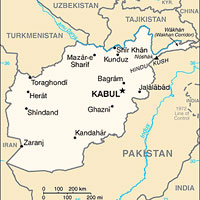Interfax: Russia free to suspend NATO transit to Afghanistan across its territory – official

(Interfax – April 4, 2014) NATO’s decision to suspend cooperation with Russia gives Moscow the right to suspend NATO transit to Afghanistan across Russian territory, Federation Council Defense and Security Committee Chairman Viktor Ozerov said.
“NATO is transporting armaments, military hardware and servicemen to Afghanistan across our territory. If our cooperation comes to a halt, we will have the right to suspend this transit, and the alliance will have to find other routes,” Ozerov told Interfax on Wednesday.
He recalled that the NATO transit to Afghanistan was based on bilateral agreements with France, Italy, the United States, Germany and some other countries.
“The NATO pullout from Afghanistan will begin soon and the alliance will have to find routes bypassing our territory. Cooperation always implies mutual interests,” Ozerov said.
In his opinion, Russia won’t lose from the halt of cooperation.
“First of all, that cooperation was advantageous for the alliance. In fact, there were nothing more than declarations of cooperation,” he stressed.
NATO has always been holding its own policy, for instance, in the expansion towards Russian borders and the deployment of missile defense systems, he said.
“The goals and tasks were ambitious, for instance, in this year’s cooperation program. However, if we look into the previous years, we will see that the intentions were implemented in secondary programs, such as mine clearing operations in Afghanistan, the deterrence of drug trafficking and homemade bombs. At the same time, no progress was made on the keynote issue, missile defense, in the previous years and NATO ignored the Russian opinion,” Ozerov said.
This is not the first time NATO suspended cooperation with Russia; the same happened in August 2008 when Russia defended its citizens in South Ossetia, he continued.
“Back then the NATO foreign ministers decided to review relations with Russia. The relations were frozen but the freeze did not last for long,” Ozerov said.
This is no more than an idle threat, Ozerov opined. “I think NATO will revise its decision very soon, as soon as passions about Ukraine calm down, and we will go back to dialogue and partnership,” he said.
Russia has invariably demonstrated its wish to develop relations with the alliance, “but it has always been a one-way road. They listened to our proposals and initiatives but nothing more. NATO continued to expand, incorporating other states and setting up bases in disregard of the Russian position,” Ozerov underscored.
Russia joined the Partnership for Peace program in the early 1990s when its cooperation with NATO had just begun, he said.
“The interaction with NATO over the Bosnian situation was the most fruitful period of our cooperation. That was the only example,” Ozerov added.
“Regardless of the position of the NATO administration, we are destined to cooperate because we live on the same continent and in the same space. Military activity of one side may have a direct influence on the security of the other side. We cannot help but view military unions of East European and Baltic states and military activity on their territories as a threat to our strategic security interests. Moreover, we will give an adequate response,” Ozerov said.
